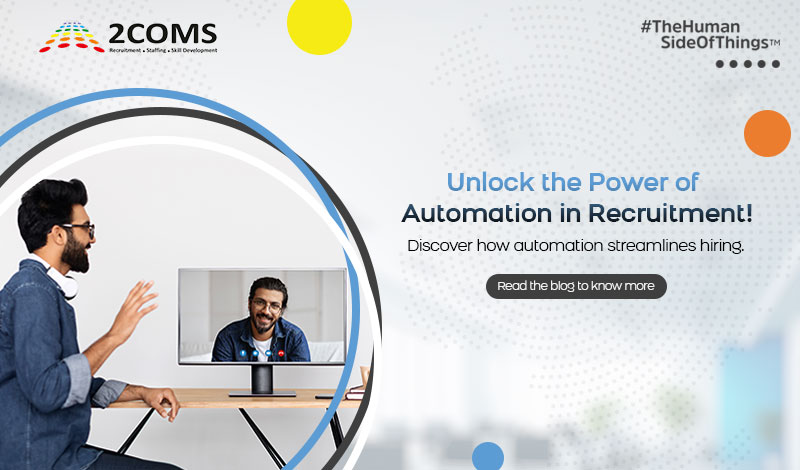Explore how automation revolutionizes recruitment processes, enhancing efficiency, precision, and talent acquisition strategies for businesses. Read the blog to know more!
In today's fast-paced business environment, recruiting has evolved significantly, which has also greatly influenced the development of technology. Automation has revolutionized the process of streamlining and optimizing the recruitment process for companies across industries. By integrating automation tools and platforms, organizations can improve efficiency, reduce costs, and ultimately improve the quality of employment. In this blog post, we will cover the various aspects of recruitment automation and explore how it can benefit business clients.
The Evolution of Recruiting Automation:
Recruiting has come a long way from traditional paper and manual screening processes. The advent of applicant tracking systems (ATS) marked the beginning of recruitment automation, allowing companies to manage job vacancies, applications, and communications more effectively with applicants. However, the possibilities of recruiting automation have greatly increased with the integration of artificial intelligence (AI) and machine learning algorithms.
Today, AI-based recruiting tools can screen thousands of resumes, identify the best candidates based on predetermined criteria, and even preview through chatbots or virtual interviews. These technologies not only save time and resources but also help companies make more data-informed hiring decisions.
Understanding Recruitment Automation:
Recruitment automation refers to the use of technology-based solutions to automate the repetitive tasks involved in sourcing, screening, and hiring candidates. These solutions use artificial intelligence (AI), machine learning (ML), natural language processing (NLP), and other cutting-edge technologies to streamline the recruiting workflow. Automation is transforming traditional recruitment processes, from CV structuring and candidate matching to interview planning and conducting, making them faster, more accurate, and less resource-intensive.
Advantages of Automation in Recruiting:
- Efficiency: Automation reduces the time and effort required for repetitive and time-consuming tasks such as screening resumes, sourcing candidates, and scheduling interviews. By automating these processes, companies can significantly accelerate their hiring timelines, ensuring faster candidate placement and shorter time to hire.
- Better Candidate Experience: Automation enables companies to provide a seamless and personalized candidate experience during the recruiting process. Automated communication tools like chatbots and email templates can quickly respond to candidates, and provide status updates and constructive feedback, increasing positive candidate engagement and brand image.
- Informed decision-making: Automation generates massive amounts of data throughout the recruiting lifecycle including candidate profiles, assessment results, and recruitment metrics. By leveraging analytics and reporting tools, companies can gain valuable insights into their recruitment processes, identify bottlenecks, and make informed decisions to continuously optimize their recruitment strategies.
- Less bias and greater diversity: Automation minimizes human bias in traditional recruitment practices. evaluate candidates objectively based on predefined criteria and skill assessments. It helps companies promote diversity and inclusion in their workforce by ensuring fair and equitable candidate selection processes.
- Cost savings: Although the initial investment in automation technology may seem daunting, there are long-term savings associated with reduced manual labor and improved efficiency, and better employment outcomes are important. Companies can allocate resources more strategically, focusing on value-adding activities that drive business growth and innovation.
Challenges and Considerations:
- Integration complexity: Introducing automation tools into existing recruiting processes can lead to integration issues, especially for companies with legacy systems or decentralized workflows. It is important to carefully evaluate the compatibility and scalability of automation solutions to ensure seamless integration and minimal disruption to operations.
- Data privacy and security: Automation involves the processing of sensitive candidate data, which raises concerns about data protection and data security compliance. . Businesses must comply with strict data protection regulations such as GDPR and CCPA and implement strong security measures to protect candidate information from unauthorized access, data breaches, and misuse.
- Algorithmic bias: While the goal of automation is to reduce human bias in recruitment, Algorithms themselves can inadvertently introduce bias. stored unless properly calibrated or checked. Companies should regularly monitor and review their automation systems to identify and correct potential biases or discrepancies in applicant evaluation and decision-making processes.
- Human touch vs. Automation: Will balance the efficiency benefits of automation with the need for human interaction and empathy. recruitment is important. While automation simplifies administrative tasks, recruiters play an important role in building relationships, assessing cultural fit, and understanding candidate motivations, as well as improving the overall candidate experience.
- Continuous learning and adaptation: Companies must embrace a culture of continuous learning and adaptation, stay on top of industry trends, experiment with new automation tools, and refine their strategies to remain competitive to attract top talent.
Best Practices for Implementing Recruiting Automation:
- Define Clear Goals: Identify specific pain points and goals you want to achieve with automation, whether it's improving efficiency, improving the candidate experience, or reducing attrition. Set measurable goals and key performance indicators (KPIs) to monitor the effectiveness of automation projects.
- Choose the right technology: Choose the automation tools and platforms that fit your business needs, scalability, and budget constraints. Conduct thorough research, evaluate vendor offerings, and consider factors such as user interface, integration features, and customer support services.
- Provide training and support: Invest in comprehensive training programs to provide recruiters and managers with the skills and knowledge they need. use automation effectively. Provide ongoing support and guidance to resolve challenges or issues during the implementation process.
- Ensure transparency and accountability: Maintain transparency in your hiring process by clearly communicating how automation is used and how it affects candidate selection. Create accountability mechanisms to monitor algorithmic decision-making and proactively correct any discrepancies or biases.
- Ask for feedback and iterate: Ask for feedback from both internal stakeholders and candidates to continually refine and improve your automation strategies. Actively listen to concerns, iterate processes based on insights, and make iterative improvements that lead to positive outcomes for all involved.
By embracing automation, you're not just saving time and money; you're unlocking a world of possibilities. You can attract top talent, build a diverse and inclusive workforce, and make data-driven decisions that fuel your business growth. So, ditch the phone booth and step into the rocket ship. The future of recruitment is here, and it's powered by automation. Are you ready to take flight?
Remember,
this is just the beginning. The world of recruitment automation is constantly evolving, offering exciting new possibilities every day. Stay tuned, and get ready to experience the future of talent acquisition!



























